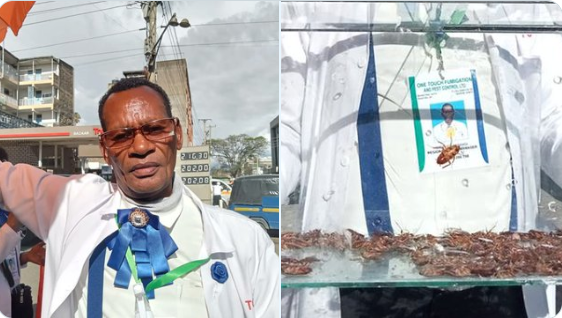In the lively afternoon bustle of Nakuru’s streets, a palpable sense of curiosity took hold of onlookers, drawing them into a sizable congregation eager to witness an extraordinary spectacle.
Among the captivated spectators stood Stephen Mwangi, armed not with conventional marketing paraphernalia but rather with containers teeming with live cockroaches and bedbugs.
This wasn’t a scene lifted from a horror flick; rather, it was Mwangi’s avant-garde approach to promoting a novel insecticide named ‘One Touch.’
The unorthodox marketing strategy unfolded as Mwangi orchestrated live demonstrations right outside the Rift Fries restaurant, an enterprise that added an unusual dimension to the local streetscape.
The amassed crowd gawked, a blend of bewilderment and fascination etched across their faces, as they observed insects crawling within glass containers juxtaposed with bottles of the heralded pesticide.
In an exclusive tête-à-tête with Mtaa Wangu, Mwangi illuminated the genesis of this attention-commanding tactic.
Endowed with a wealth of sales experience, Mwangi discerned the necessity for an unconventional methodology when ushering ‘One Touch’ into the Nakuru market.
“Having been in sales for a considerable duration, I recognized the need for an approach that would truly captivate the audience when introducing the insecticide to the Nakuru market,” he shared.
In his capacity as a Regional Sales Manager, Mwangi disclosed that this atypical strategy had been set into motion nearly two years prior.
Given Nakuru’s status as a nascent market, a bold initiative was imperative to seize attention and spur sales.
Live demonstrations, featuring the very pests that ‘One Touch’ aimed to eradicate, emerged as the consummate strategy.
When probed about the provenance of the roaches and bedbugs featured in his demonstrations, Mwangi elucidated, “We’ve enlisted a group of individuals to procure them for us. As our offices are situated in Nairobi, we presently source them from there, and the insects are dispatched to Nakuru via parcel.”
Interestingly, Mwangi disclosed the acquisition cost of these disconcerting creatures at Sh5 per insect.
Claiming to have initiated with 200 cockroaches, Mwangi asserted that his daily collection has burgeoned to encompass up to 1000 cockroaches.
The insects, he clarified, are transported to Nakuru in sacks to safeguard against suffocation during transit.
Despite the idiosyncrasy of his marketing approach, Mwangi’s strategy appears to be gaining momentum.
As Mwangi engages with patrons at his stall, peddling both the concept and the product, he remains receptive to the singular business of procuring roaches from anyone amenable to parting with them.
It’s an unconventional venture, but in the ever-evolving realm of marketing, Mwangi’s insect-infused innovation might just be the buzz Nakuru craves.


0 comment
Please help me with the link..I connect you with many customers